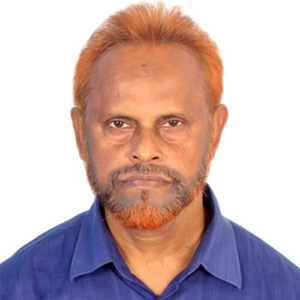Title : Soil salinity problem in bangladesh and its alleviation by morphometric and ssr marker-based screening for salinity tolerance in local and exotic wheat genotypes
Abstract:
Bangladesh is an agrarian country. Agriculture here is vulnerable to various climatic and edaphic factors. Soil salinity is one of the major abiotic stresses affecting crop yield. The intensity and extent of soil salinity are increasing day by day in Bangladesh. As a result food and nutrition security is under threat. Problems related to salinity can be alleviated by identifying saline tolerant genotypes. Salt affected soils can be better utilized by developing and growing salt tolerant wheat varieties. In this study, screening was conducted to evaluate the salt tolerance capacity of wheat genotypes by hydroponic culture and microsatellite markers. Screening at seedling stage of 46 (21 Bangladeshi and 25 exotic) wheat genotypes was carried out by culturing in hydroponic solution (0, 9, 12 and 15 dS/m) on the basis of Salt Tolerant Index (STI) and microsatellite markers. DNA was isolated, quantified and characterized by 30 salinity-linked primers to identify salt-tolerant genotypes. Seedlings under salinized conditions showed salt injury symptoms like yellowing of leaves, drying leaves, reduced shoot and root growth, stunted growth and death of seedlings. BINA Gom-1 (check variety) showed moderate tolerance (12 dS/m) to salinity. Significant positive correlations at both genotypic and phenotypic levels were recorded for root length with shoot length, fresh and dry weight of shoot, and root dry weight. ESWYT P-2, Borkot, ESWYT P-5, Agroni, ESWYT P-8, BARI Gom-23, ESWYT P-30, ESWYT P-19, ESWYT P-12 exhibited the highest salt-tolerant indices. The highest PIC and gene diversity, 0.711 and 0.750 were produced by the marker Xgwm-493 suggesting it as most suitable to evaluate salt tolerance. The UPGMA cluster analysis discriminated the 46 germplasm into seven major clusters. BARI Gom-23, BAW-1263, BAW-1272, BAW-1280 and BARI Gom-19, which showed high to moderate tolerance level of salinity, were located along with control variety BINA Gom-1 in the same cluster 1. Studying both morpho-molecular parameters, it is strongly suggested that these varieties and accessions may be the best candidates for breeding program to incorporate salinity tolerant genes.
Keywords: Genetic diversity, Salt tolerance, Wheat, SSRs, STI


